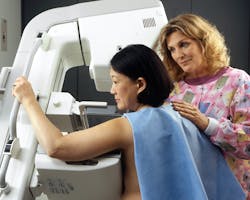Focused genetic testing recommended for breast and ovarian cancers
Concentrating on about 20 key genes known to be associated with breast or ovarian cancer is likely to provide patients and their doctors with news they can use, according to a new study from Stanford Medicine and the University of Michigan, according to a news release.
In contrast, widening the search to include more and more genes increases the number of uncertain results, particularly for racial and ethnic minorities.
Unfortunately, only about one third of ovarian cancer patients undergo genetic screening to identify mutations that could guide the course of treatment. (Such testing is recommended for all people with ovarian cancer, and recommendations for those with breast cancer vary according to age at diagnosis and family history of cancer, among other parameters.)
The research appears in the Journal of Clinical Oncology.
The finding builds on previous research by Allison Kurian, MD, MSc, a Stanford Breast and Gynecologic Cancer Specialist, and Steven Katz, MD, MPH, a University of Michigan Professor of Medicine and Health Management and Policy.
That research investigated the prevalence of genetic testing in people diagnosed with breast or ovarian cancer in California and Georgia from 2013 to 2014; while the new study included people diagnosed through 2017. Unfortunately, little improvement was seen over the longer timespan.
The researchers found that about one-quarter of the nearly 200,000 people with breast cancer and one-third of 14,689 patients with ovarian cancer underwent genetic testing. Overall, testing prevalence increased by about 2 percent each year during the study period.
"It is striking and concerning that there has been no significant improvement in testing ovarian cancer patients from 2013-2019; still only around one-third are tested, yet all of them should be," Kurian said. "While we don't know all the reasons for this under-testing, our prior work suggested that access disparities associated with insurance status and race and ethnicity might play a role."
Increasing access to testing and genetic counseling might be accomplished by at-home saliva testing or the use of telehealth platforms, the researchers speculate.
But sometimes the testing pinpoints spots in a patient's genes that differ from the expected sequence but have no known clinical impact. These variants of uncertain clinical significance, or VUS, become more prevalent as the number of genes examined increases -- particularly for racial and ethnic minorities.
Kurian and Katz found that the average number of genes analyzed by multi-gene panels meant to detect cancer-associated mutations increased by about 28 percent each year during the study period. Correspondingly, the prevalence of VUS also increased significantly -- doubling from about 11 percent in people diagnosed in 2013 to about 27 percent in 2017. In particular, nearly half of all findings for Black or Asian patients were classified as VUS as compared to about one-quarter of non-Hispanic white people.
"Many fewer minority patients than non-Hispanic whites have undergone genetic testing, and thus we know much less about the normal spectrum of genetic variation in minority populations," Kurian said. "Accordingly, genetic testing of minorities more often reveals variants that have not been well-characterized, and thus are classified as uncertain."
It might seem counterintuitive to examine fewer genes in order to deliver greater benefit. But uncertain results can be disconcerting for patients and their doctors. And, in Kurian and Katz's study, adding ever more genes to the gene panels didn't deliver any additional clinical benefit for most patients.

